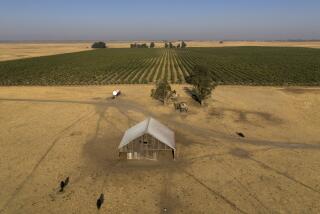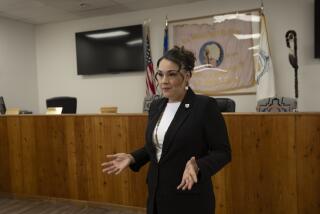Ante raised in town’s fight against gambling : Colorado mayor threatens civil insurrection if state measure to outflank city passes.
- Share via
MANITOU SPRINGS, Colo. — A mayor is the last person one might expect to threaten civil insurrection.
But Manitou Springs Mayor Bud Ford vows to “personally man the barricades” if a knot of mostly local investors succeeds in “cramming gambling down our throats.”
Twice before, this summer-tourist community of 4,500 people in the shadow of Pikes Peak has fended off attempts to bring slot machines and card tables to town. They reiterated that stance last November in an advisory election, when an overwhelming majority said they did not want gambling here. Locals thought that was the end of the matter. Too soon.
Five investors have managed to put an initiative on next November’s state ballot that will let Coloradans decide whether this placid nest of bed-and-breakfast inns, art galleries and antique shops could become one the largest gaming resorts in the Rockies.
Townsfolk are hopping mad that the fate of their community is tucked inside a broader measure designed to allow gambling specifically at Manitou Springs and at municipal airports statewide, ostensibly to raise funds for public schools.
The investors call their political action group the Committee for Better Schools.
A local group--Citizens Opposed to Gambling With Manitou Springs (COG)--that is trying to sink the initiative calls it Slots for Tots.
If passed, the five businessmen, referred to by state revenue analyst Susan Conwell as the McSlot Kings, would be guaranteed rights to all gaming licenses in Manitou Springs. They are planning a $60-million to $100-million gaming center here with a maximum potential of 10,000 gaming devices.
That compares with the 11,100 games now operating in Colorado’s three gaming towns--Central City, Cripple Creek and Black Hawk.
Old-timers here say that big-time gaming would undermine a local economy that for over a century has banked on its gurgling mineral springs, historic hotels and spectacular mountain setting.
Much of Manitou Springs’ downtown sector is on the National Register of Historic Places, a drawing card for tourists who flock here from June through September to ride the cog railway to the 14,110-foot summit of Pikes Peak and browse for art and antiques in the downtown shops.
“The customers who come to play the quarter slot machines won’t come to shop for art or antiques,” Ford said, standing beside one of 22 sculptures the city leases from local artists for public display throughout town.
Not so, says investor Harvey Blasdale, who argues that the gaming--proposed for outside the historic district--would increase everyone’s business.
With the gambling town of Cripple Creek planning to add substantial new lodging facilities only 35 miles southwest of here, he said, “this town better do something quick.”
Among the businesses that stand to benefit is Blasdale’s new Super 8 motel, which is in the middle of the proposed gaming district.
Blasdale’s colleagues are quick to remind that there is more at stake than Manitou Springs’ prosperity. Investor E. Malcolm Guthrie, who has an option on 11 acres of commercial property in the proposed gaming district, figures that separate gambling at up to 16 municipal airports statewide could generate between $50 million and $150 million a year for Colorado schools.
State officials are less optimistic and project a best-case scenario of $13 million. Some officials even doubt whether the measure would add a cent to the school fund.
Here’s why. The measure, they say, places no ceiling on the amount that airports could reinvest in their own operations. “Frankly,” said state budgeting analyst Carol Poole, “if it were my airport, I wouldn’t want any money left over for taxes.”
Added Colorado Department of Education finance consultant Don Herman: “Nobody over here is excited about this being a potential source of revenue.”
The investor group insists that detractors are being myopic. But local antique store operator John Roberts scoffs at suggestions that the town needs the kind of business that gaming would bring.
Indeed, a recent city study showed local sales revenues increasing 52.5% over the past five years. Real estate agents say there are 40 buyers for every house that hits the market in the town that has become a bedroom community for nearby Colorado Springs, home of the Air Force Academy. “Look,” said Roberts, co-owner of Firefly Antiques, with a wave of the arm on the main drag through town, “90% of the businesses have ‘No Gaming’ signs in their windows.”
Others here are even more aghast at attempts by the investor group to interpret the results of the advisory vote last November to their own advantage.
Blasdale insists that people were only voting on an “idea,” not a specific proposal when 88% of those who went to the polls said they did not want gaming here. “The number who voted,” Blasdale said, “compared with the total number of registered voters amounts to only one-third of them saying no.”
“Using that logic,” snickered Manitou Springs City Councilman John Shada, “George Bush really won the last election.”
It’s not a laughing matter for Ford. If the measure passes, Ford said, pulling a pocketknife out of his jeans to scrape gum off a storefront, “I’ll encourage everyone to join me in civil disobedience.”
More to Read
Sign up for Essential California
The most important California stories and recommendations in your inbox every morning.
You may occasionally receive promotional content from the Los Angeles Times.













